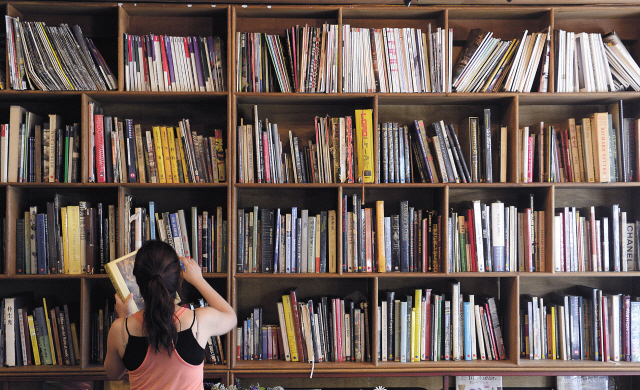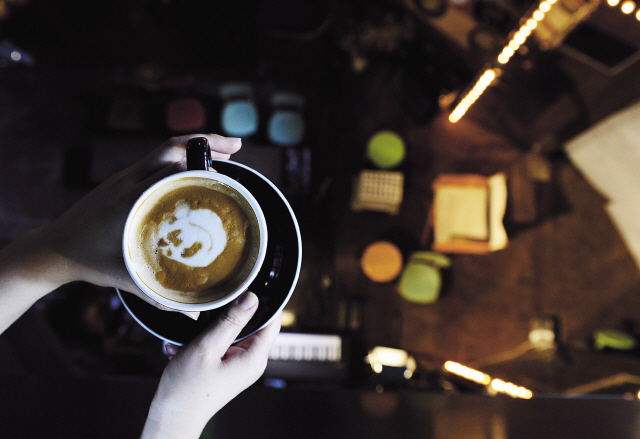Selling more than coffee, cafes double as community-focused cultural hubs
Yri Cafe co-owner Kim Sang-woo relaxes behind the counter of his joint, exuding the laidback ease of someone who is in his element.
Wearing a frayed T-shirt like a uniform, his nonchalant, proprietary slouch makes it evident he runs the place.
At one of the tables, a guy dozes off, head down. Another group studies in silence. A slight breeze filters in through the floor-length, antique-style windows.
The lowkey vibe suits the environs ― a patch of near-residential turf in Sangsu-dong, which borders its more famous cousin, Hongdae.
 |
Patrons can read from the wide selection of books available at Yri Cafe. (Park Hae-mook/The Korea Herald) |
According to Kim, Yri Cafe was one of the first coffee shops to open on this street. Originally located in Hongdae’s Seogyo-dong, Yri moved to its current spot three years ago.
“There were no cafes,” said the 38-year old poet and musician. “It was a residential area.”
Now, a smattering of eateries and coffee shops has opened nearby and Kim seems less than thrilled.
“The feel of the area has transformed greatly. I am worried.”
Kim said establishments started popping up rapidly two years ago and new places are still opening as we speak. He fears it will become crowded like Hongdae, which for some is its draw, but Kim seems to prefer a more secluded atmosphere.
For now, at least, Sangsu-dong still retains its on-the-cusp bohemian yet suburban attitude ― a sweet, offbeat aura fostered by places like Yri and newer addition, Jebi Dabang.
 |
At Jebi Dabang, patrons on the first floor can enjoy performances held on the basement floor of the two-story coffeehouse through the ceiling’s opening while tipping back drinks like the cafe latte pictured here.(Park Hae-mook/The Korea Herald) |
Yri Cafe and Jebi Dabang are coffeehouses in every sense of the word.
Both pay homage to the old school salon, seeking to provide a haven for artists and intellectuals. Coffee is not the only item on the menu, Yri and Jebi sell culture.
“We call this a playground for residents and artists,” said Jebi Dabang CEO Oh Sang-hoon.
Run under umbrella organization Cultural Topography Research ― which was founded by CEO-architect Oh, artist Oh Chang-hoon and scriptwriter Lee Seung-hun ― Jebi opened in late April.
By day, it operates as Jebi Dabang (which means “Swallow Cafe” in English) and by night, it runs under the pithy moniker Chwihan Jebi (Drunken Swallow).
Korean literature buffs will recognize the name of the coffeehouse as that of the cafe opened by writer Yi Sang in 1933.
CEO Oh hopes that by taking on the title Jebi Dabang some of its historic relevance as a gathering spot for artists will rub off on this modern-day take on the old European salon.
The two-floor establishment functions as a performance venue at night (generally Fridays and Saturdays), where audiences can hangout and enjoy free music.
“Customers can decide how much the performance is worth and shell out accordingly,” said Oh, 36.
Coffee is sourced from a local roaster, nachos from a local artisan who makes the salsa and chips from scratch.
A bench was built outside for people waiting for the bus that stops in front of Jebi.
“We want to be in for the long haul and be a part of this local turf,” said Oh.
“Sangsu-dong’s charm is that is like the Hongdae of yore,” Oh elaborated. “Everyone knows everyone.”
In other words, this area functions like a tight-knit community, a vibe that both Jebi’s Oh and Yri’s Kim associate with Hongdae back in the day, before it became a major clubbing and eating hotspot.
Community seems to be what both Jebi Dabang and Yri Cafe desire.
“I want our cafe to be like that large bench-like table you often find in Korean hanok or villages, the huge flat perch that residents or families sit, eat and rest on,” said Yri co-owner Kim. “I want artists to be able to be at ease here.”
Musician-poet Kim and artist-co-owner Lee Joo-yong took inspiration from Korea’s 1960s and 1970s salon and cafe culture with their coffeehouse. The Korean hanok informs the interior of the space, infusing it with a vintage vibe.
The furniture is either secondhand or from their first location. The coffee is sourced from a local roaster. Books, available for reading, line shelves. The shop also puts out its own monthly publication, which features everything from poetry to stories to comics.
“Our customers come and linger for a long time,” said Kim. “Some even teach music here and hold guitar lessons. When they do, we turn off the music for them.”
At night, about three times a month, Yri Cafe holds music performances, public readings and poetry recitals.
On Saturdays, until April, free Korean calligraphy lessons were provided and Kim says the lessons will be starting again soon.
“I think we can create a place like this because we are both artists,” said Kim. “We create art, music and poetry, so we have that openness and freeness.”
By Jean Oh
oh_jean@heraldcorp.com)
Details
● Yri Cafe; 337-4 Sangsu-dong, Mapo-gu, Seoul; (02) 323-7861; open 11 a.m. to 1 a.m. Sundays through Thursdays, till 2 a.m. Fridays and Saturdays; coffee-based drinks cost 4,000 won to 6,500 won and come with one free refill
● Jebi Dabang-Chwihan Jebi; 330-12 Sangsu-dong, Mapo-gu, Seoul; (02) 325-1969; open 10 a.m. to 2 a.m. daily; coffee-based drinks cost 3,000 won to 4,500 won, with an additional 1,000 won for iced versions









